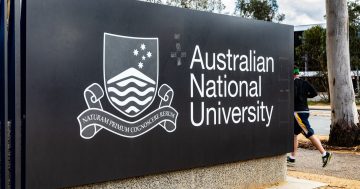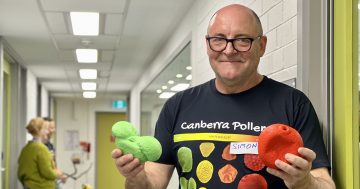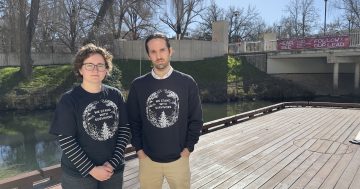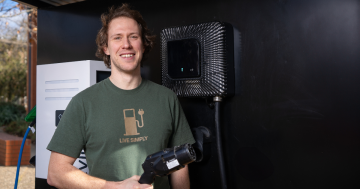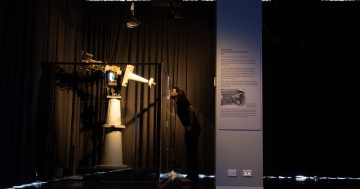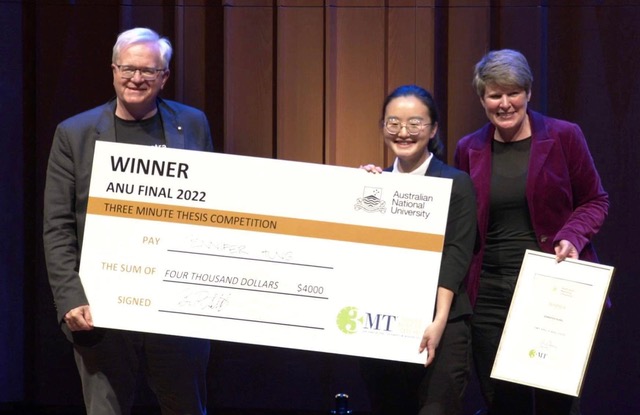
Yu-Ting (Jennifer) Hung won the ANU’s Three Minute Thesis competition in 2022. Photo: Supplied.
Curious about the cholesterol uptake in malaria parasites? Ever wondered about Australian citizenship in law and literature? Or even the chemical elements inside ancient star clusters?
These are a few of the topics 12 young researchers will be challenged to explain to an everyday audience in three minutes with the aid of a single PowerPoint slide this Thursday (July 27).
Members of the public are invited to attend the Australian National University’s (ANU) rendition of the so-named Three Minute Thesis (3MT) competition, which plays out across more than 900 universities in more than 85 countries. The students will go head-to-head for a prize pool of $12,000 and the chance for just one of them to compete in the Asia-Pacific grand final this October.
Yu-Ting (Jennifer) Hung is a final year ANU PhD student studying mRNA translation, winner of last year’s ANU 3MT competition and one of the competition’s five judges this year.
“For the first few years of my PhD, I was enjoying what I was doing, but I also was really struggling to put into words why I was doing it, apart from just pure curiosity,” she says.
“So going through the process of writing up a pitch, refining it and delivering it, I think I really gained a lot of clarity in why I’m doing what I’m doing now.”
ANU encourages its students to take part in 3MT to develop skills crucial for a successful post-PhD career, but Yu-Ting says there’s more to it than just personal gain.
“If you can’t justify why you’re doing the research, then it can be really hard to get other people interested in your research and provide funding for it,” she agrees.
“But at the end of the day, this is publicly funded research, so there’s a responsibility on the side of the researchers to really show the public what they’re doing.
“Especially at a time when we’ve got a lot of misinformation and distrust in science, I think that responsibility is even bigger than before.”
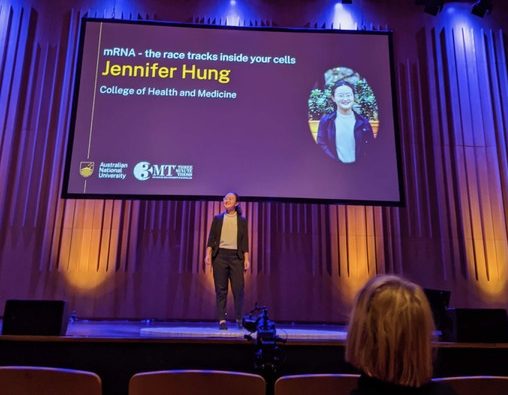
Yu-Ting used the analogy of a racetrack in her winning presentation. Photo: Supplied.
Yu-Ting’s winning 3MT entry saw her PhD research into mRNA translation in yeast cells combine with inspiration from Netflix sensation, Formula 1: Drive to Survive.
“I was watching that reluctantly, not of my own choosing, and this analogy just came to me in the moment, so I guess something good came out of having to watch that,” she laughs.
Yu-Ting used a combination of racetrack analogies and references to the mRNA COVID-19 vaccines to convey the complex process by which our bodies make proteins from mRNA.
But this year she joins the panel of judges charged with determining how well the finalists have communicated years of complex research, which is typically published in 80,000 to 100,000 words, a far cry from a three-minute presentation. “It’ll be interesting to be on the other side of that and I’ll definitely be able to relate to the nervousness and the jitters of all the contestants,” she says.
“I’ll definitely be really looking for how they can demonstrate the way their research is going to be applied in everyday life because that’s one thing I always really struggled with.
“Somehow I managed to find a way so I’m really hoping to see … whether or not they can really advocate and promote their research in a way that the general audience can understand.”
Yu-Ting says she’s avoided all rounds of the competition leading to the ANU finals so she can go in unbiased and listen with fresh ears to the presentations, which include:
- Nick Bariesheff’s research on the intricate molecular pathways underlying exercise-induced protection against age-related diseases.
- Zoe Piper’s research on cross-sector careers (individuals concurrently working across industry, research and government).
- Ryan P. O’Donnell’s research on the evolution of the Australian orchid flora and their mycorrhizal symbionts.
- Yabo (Joy) Yan’s research on health reform, health politics and chronic disease management reform.
- Terri Warner’s research on mental health sector policy, governance, education and training roles.
- Nusrat Haider’s research on the intersections between accounting and its broader implications.
- Diana Tung’s research on social and environmental impacts of aguaje commercialisation.
- Logan Davis’ research, which involves the creation of 3D maps of flaws inside diamonds.
- Dan Virah-Sawmy’s research on renewable energy solutions for the Great Barrier Reef.
- Madeleine McKenzie’s research on the chemical elements inside ancient star clusters.
- Amy Hamilton’s research on Australian citizenship in law and literature.
- Sai Ramesh’s research on the cholesterol uptake in malaria parasites.
To find out more or register to attend the ANU 3 Minute Thesis Competition Final on Thursday 27 July, from 6 pm, please visit the eventbrite page.













